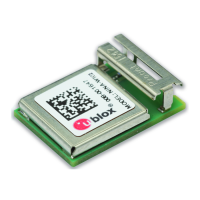NINA-W1 series - User Manual
Design-in
3.1 Overview
For an optimal integration of NINA-W1 series modules in the final application board, it is
recommended to follow the design guidelines stated in this chapter. Every application circuit must
be properly designed to guarantee the correct functionality of the related interface, however a
number of points require high attention during the design of the application device.
The following list provides important points sorted by rank of importance in the application design,
starting from the highest relevance:
1. Module antenna connection: Ant pad
Antenna circuit affects the RF compliance of the device integrating NINA-W1x1 modules with
applicable certification schemes. Follow the recommendations provided in section 3.3 for
schematic and layout design.
2. Module supply: VCC, VCC_IO, and GND pins
The supply circuit affects the performance of the device integrating NINA-W1 series module.
Follow the recommendations provided in section 3.2 for schematic and layout design.
3. High speed interfaces: UART pins
High speed interfaces can be a source of radiated noise and can affect compliance with
regulatory standards for radiated emissions. Follow the recommendations provided in section
3.4.1 for schematic and layout design.
4. System functions: RESET_N, GPIO and other System input and output pins
Accurate design is required to guarantee that the voltage level is well defined during module
boot.
5. Other pins:
Accurate design is required to guarantee proper functionality.
3.2 Supply interfaces
3.2.1 Module supply (VCC) design
Good connection of the module’s VCC pin with DC supply source is required for correct RF
performance. The guidelines are summarized below:
The VCC connection must be as wide and short as possible.
The VCC connection must be routed through a PCB area separated from sensitive analog signals
and sensitive functional units. It is a good practice to interpose at least one layer of the PCB
ground between VCC track and other signal routing.
There is no strict requirement of adding bypass capacitance to the supply net close to the module.
However, depending on the layout of the supply net and other consumers on the same net, bypass
capacitors might still be beneficial. Though the GND pins are internally connected, connect all the
available pins to solid ground on the application board, as a good (low impedance) connection to an
external ground can minimize power loss and improve RF and thermal performance.
3.2.2 Digital I/O interfaces reference voltage (VCC_IO)
Good connection of the module’s VCC_IO pin with DC supply source is required for correct
performance. The guidelines are summarized below:

